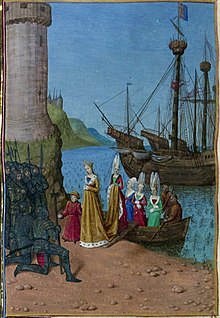
Wu was around 13 years old when she became a member of Emperor Taizong of Tang's court, as his concubine. She was reported to have been happy at the opportunity to join the court, having an ambitious eye from a young age. The Emperor died in 649, leaving his son Emperor Gaozong of Tang, ruler of China. It is said that at this point in her life, Wu was sent away from court to a nunnery, but other reports have her at court only a year later. It is unknown what occurred in this period, other than that she became the favorite concubine of the new emperor by 650 AD.
Wu gave birth to several sons in line for the throne. Her power grew during this period, until she finally rid herself of her greatest obstacle: Gaozong's wife, Empress Wang. She told the emperor that his wife had killed his newborn child. Historians are unsure of whether Wu killed the child herself in order to blame the other woman, or Wang really did it. However, the result was Gaozong naming a new empress, Wu Zetian.
Within their first five years of marriage, the emperor became too sick to rule. It has been said that the sickness was due to poisoning, a likely candidate of such a thing being Wu Zetian. However, nothing can be proved. Due to her husband's inability to rule, Wu took over much of the reigning power. She established a secret police force to carry out her bidding. She ordered executions and jailings for anyone who opposed her. When her husband died, she changed the order of succession so that her youngest and most vulnerable son would rule.

She eventually got tired of ruling through her sons, and forced her final son to abdicate, naming herself ruler well into her life. While she ruled, she promoted the works of women throughout China. She gave political positions to women, and had scribes record the accomplishments of Chinese women. She believed that a good ruler acted towards her people as a mother towards her children. Which is easy to believe, considering that she likely killed one or more of her children.
She moved the country away from its reliance on military force, instead focusing on the works of scholars. The period of her rule is said to be one of the most artistic and scholarly in the history of China. She helped the poor by lowering taxes and offering public services, encouraging growth in many areas often ignored by the ancient Chinese.
Wu also focused on religion, favoring Buddhism. She had scholars come to her court and build sculptures and temples for the gods. Her rule saw the greatest development of Chinese Buddhism in the history of the country.
Towards the end of her long life, Wu was said to have become more fearful of those around her. She was often extremely harsh and unforgiving towards those who had offended her. Throughout her life, she'd had no fear of hurting others in order to attain security for herself. She was said to have killed many who she thought posed a threat to her rule, including almost the entirety of the Li family, who she rounded up and forced to commit suicide, suspecting that they had a claim to the throne and were plotting against her.
Overall, Wu Zetian did many amoral things throughout her life in order to establish and hold power over others as Empress of China. However, the time of her reign saw cultural growth in China, as well as a rise in women's rights throughout the country.
Smithsonian Magazine had this to say about the empress:
“Explaining why the empress was so
reviled, then, means acknowledging the double standard that existed–and still
exists–when it comes to assessing male and female rulers. Wu probably did
dispose of several members of her own family, and she ordered the deaths of a
number of probably innocent ministers and bureaucrats. She also dealt
ruthlessly with a succession of rivals, promoted members of her own family to
high office, succumbed repeatedly to favoritism, and, in her old age,
maintained what amounted to a harem of virile young men. None of these actions,
though, would have attracted criticism had she been a man. Every Chinese
emperor had concubines, and most had favorites; few came to power, or stayed
there, without the use of violence. Taizong forced the abdication of his own
father and disposed of two older brothers in hand-to-hand combat before seizing
the throne.”
Similarly to Isabella of France and Eleanor of Aquitaine, Wu Zetian did everything to maintain power, including using the methods of men throughout the centuries, but is held far more accountable for her actions. This has much to do with the stereotyping of women as either "a bimbo or a bitch" present still today. Women are viewed in two lights, either as the stupid woman or the one who poses a threat to males, and is therefore evil. Think about it.

